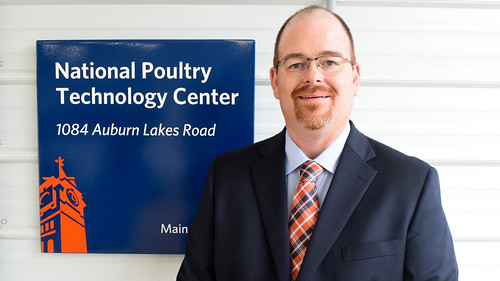Davis named director of Auburn’s National Poultry Technology Center
Article body
Auburn University biosystems engineer Jeremiah Davis has assumed duties as director of the Auburn-based National Poultry Technology Center, or NPTC.
Davis had served as associate director of the research and outreach center since joining the Auburn faculty in 2015 and succeeds Jim Donald, who retired Dec. 31 as Department of Biosystems Engineering professor emeritus and NPTC director emeritus.
In announcing Davis’ selection to the post, College of Agriculture Dean Paul Patterson said poultry producers and the entire poultry industry can expect a seamless transition.
“The NPTC serves a vital role for the poultry industry at the state, regional and national levels in carrying out its mission to improve bottom-line profitability of the live production sector,” he said. “I believe Dr. Davis’s impressive research background and his success as associate director make him an excellent fit for this role.”
He commended both Donald and Auburn agricultural economics professor and Alabama Extension specialist Gene Simpson, who also retired in December, for their strong commitment to fulfilling the NPTC’s mission of developing technologies and practices that have helped poultry growers increase efficiencies in housing, equipment, energy use and environmental control.
Donald and Simpson were instrumental in the center’s establishment in 2007, and they—along with Davis and Extension specialists Jesse Campbell and Dennis Brothers—have built the facility into a nationally respected industry resource that has saved poultry producers an estimated $30 million to date.
The NPTC facility is located in the Charles C. Miller Jr. Poultry Research and Education Center north of Auburn’s main campus.
Related Media
Media interested in this story can contact Communications Director Preston Sparks at (334) 844-9999 or preston.sparks@auburn.edu.
Auburn University is a nationally ranked land grant institution recognized for its commitment to world-class scholarship, interdisciplinary research with an elite, top-tier Carnegie R1 classification, life-changing outreach with Carnegie’s Community Engagement designation and an undergraduate education experience second to none. Auburn is home to more than 30,000 students, and its faculty and research partners collaborate to develop and deliver meaningful scholarship, science and technology-based advancements that meet pressing regional, national and global needs. Auburn’s commitment to active student engagement, professional success and public/private partnership drives a growing reputation for outreach and extension that delivers broad economic, health and societal impact.





